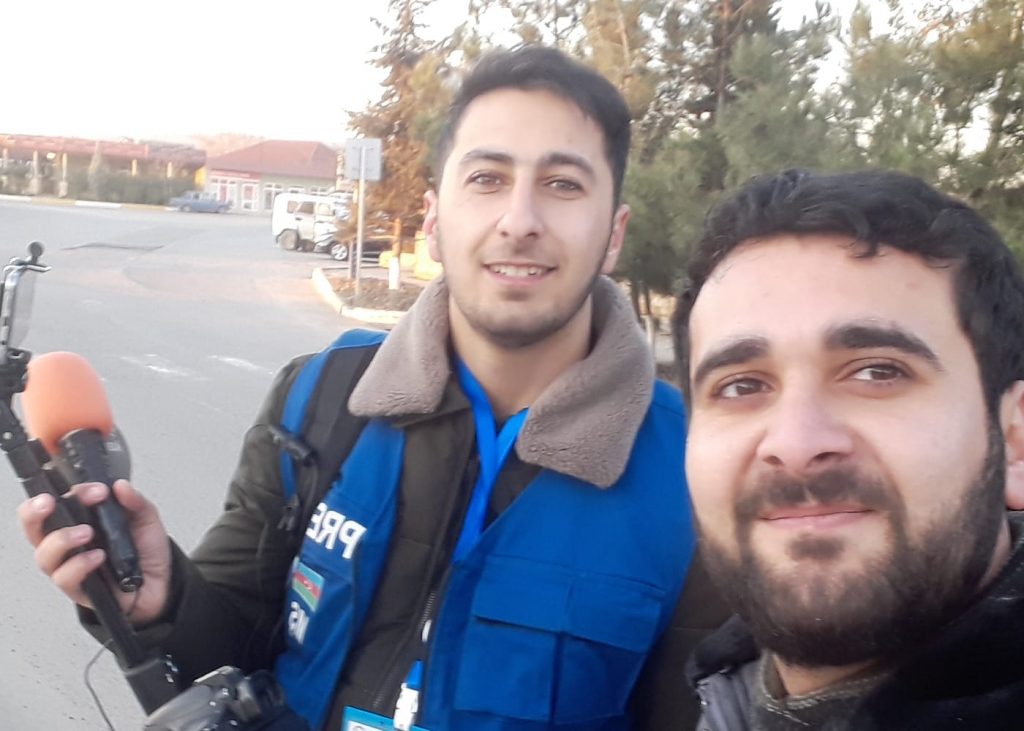Since the special quarantine regime was declared in Azerbaijan on 24 March, three journalists have been arrested.
This new wave of repression has been condemned by critics of the Azerbaijani government, with Ali Karimli, the leader of the opposition Popular Front Party, calling government actions a ‘hunt’ for journalists.
The two most recent arrests were that of Ibrahim Vazirov and Mirsahib Rahiloghlu, both of which took place on 13 April. Meanwhile, the third journalist, Natig Izbatov was arrested on 9 April.
Vazirov was placed under a 25-day administrative arrest, while Rahiloghlu and Izbatov received 20 and 30 days, respectively. All three have been critical of the authorities and highlighted the difficulties faced by Azerbaijanis during the quarantine regime.
Allegations of entrapment
Vazirov, a journalist for the online news organisation Kanal24, was detained in the city of Shirvan, Kanal24 reported on Monday.
The Interior Ministry has since stated that Vazirov was arrested for disobeying police officers, who say they approached him and requested identification as well proof that he had received permission to leave home — as is required by current quarantine regulations — which he refused to provide.
Kanal24 wrote on Facebook on Monday that Vazirov’s work often highlighted a variety of social problems in Shirvan, and had as a result earned him the ire of local police. Shafa Vazirova, Ibrahim Vazirov’s mother, told Kanal24 that Vazirov was often called in by police in the city
She said they asked him to talk and take his video reportages down from the web, but he refused to do so.
Vazirova said her son, who lives in Baku, was again called in to see the Shirvan police on Monday. Initially, he refused, due to quarantine restrictions, but the police allegedly told him that he would not have any problems. He was arrested after arriving in the city.
[Read more on OC Media: Six more opposition activists arrested in Azerbaijan]
A new wave of repression
In a speech delivered on 19 March, Azerbaijani President Ilham Aliyev called any opposition group that did not enter ‘into dialogue’ with the authorities, ‘traitors and corrupt representatives of a fifth column’.
‘Look at what they say on social networks, they are full of hatred and provocation. They seem to want riots to happen. They want turmoil. They want panic’, Aliyev said.
He added that if a state of emergency were to be declared due to the COVID-19 outbreak, the ‘isolation of representatives of the fifth column’ would become ‘a historical necessity’.
Ali Ahmadov, the deputy chair of the ruling New Azerbaijan Party, wrote on Facebook on 23 March that there were ‘two viruses’ in Azerbaijan, COVID-19 and the ‘political virus’ that was the opposition, specifically Ali Karimli. He wrote that the two should be fought against at ‘the same time’.
The National Council of Democratic Forces condemned Aliyev’s speech, calling it ‘fascist’. They also accused Aliyev of planning false ‘plots’ that would give him justification for repressing the opposition.
Two days after Aliyev’s speech, Samir Babayev, a member of the opposition Muslim Unity Movement, was the first opposition activist to be arrested during the pandemic.
He was detained while he and other members of the movement distributed medical masks and information brochures about COVID-19 outside a central metro station in Baku. He was placed under administrative arrest for one month.
The following day, Tofig Yagublu, an opposition politician from the Musavat Party, was sentenced to three months in prison on the charges of hooliganism.
Later that day, Anar Malikov, a member of the Popular Front Party, was placed under administrative arrest for 10 days accused of ‘violating quarantine’.
Popular Front Party leader Ali Karimli called Babayev, Yagublu, and Malikov, ‘coronavirus prisoners’.
[Read more on OC Media: Azerbaijan arrests opposition activists during COVID-19 outbreak]




 16 April 2020
16 April 2020



